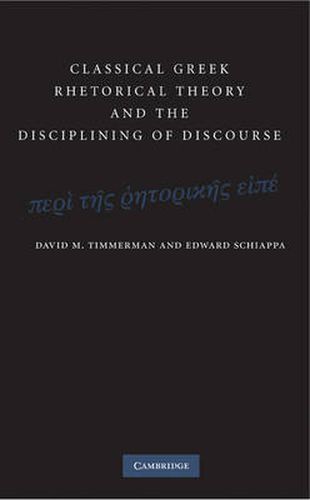Readings Newsletter
Become a Readings Member to make your shopping experience even easier.
Sign in or sign up for free!
You’re not far away from qualifying for FREE standard shipping within Australia
You’ve qualified for FREE standard shipping within Australia
The cart is loading…






This book contributes to the history of classical rhetoric by focusing on how key terms helped to conceptualize and organize the study and teaching of oratory. David Timmerman and Edward Schiappa demonstrate that the intellectual and political history of Greek rhetorical theory can be enhanced by a better understanding of the emergence of ‘terms of art’ in texts about persuasive speaking and argumentation. The authors provide a series of studies to support their argument. They describe Plato’s disciplining of dialgesthai into the Art of Dialectic, Socrates’ alternative vision of philosophia, and Aristotle’s account of demegoria and symboule as terms for political deliberation. The authors also revisit competing receptions of the Rhetoric to Alexander. Additionally, they examine the argument over when the different parts of oration were formalized in rhetorical theory, illustrating how an ‘old school’ focus on vocabulary can provide fresh perspectives on persistent questions.
$9.00 standard shipping within Australia
FREE standard shipping within Australia for orders over $100.00
Express & International shipping calculated at checkout
This book contributes to the history of classical rhetoric by focusing on how key terms helped to conceptualize and organize the study and teaching of oratory. David Timmerman and Edward Schiappa demonstrate that the intellectual and political history of Greek rhetorical theory can be enhanced by a better understanding of the emergence of ‘terms of art’ in texts about persuasive speaking and argumentation. The authors provide a series of studies to support their argument. They describe Plato’s disciplining of dialgesthai into the Art of Dialectic, Socrates’ alternative vision of philosophia, and Aristotle’s account of demegoria and symboule as terms for political deliberation. The authors also revisit competing receptions of the Rhetoric to Alexander. Additionally, they examine the argument over when the different parts of oration were formalized in rhetorical theory, illustrating how an ‘old school’ focus on vocabulary can provide fresh perspectives on persistent questions.